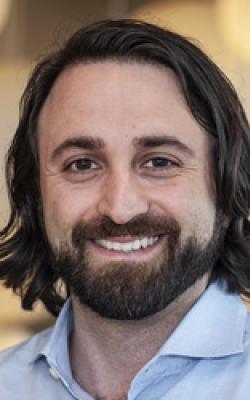Nicholas Vitanza, MD
Associate Professor Scientific Director, Pediatric Brain Tumor Research Program
Dr. Nicholas Vitanza is a pediatric neuro-oncologist and translational scientist whose career is dedicated to the care of children with high-grade CNS tumors, particularly diffuse intrinsic pontine glioma (DIPG), diffuse midline glioma H3K27M-altered (DMG), and atypical teratoid rhabdoid tumor (ATRT). During his pediatric oncology fellowship with Drs. Bill Carroll and Elizabeth Raetz at New York University, laboratory projects led to a COG clinical trial and an ASPHO award. He completed a second fellowship in pediatric neuro-oncology at Stanford University and a post-doc in Michelle Monje’s neuroscience/DIPG Lab, in which he performed high-throughput drug screens in patient-derived DIPG models and mechanistic analyses of epigenetic vulnerabilities in DIPG. This work led to publications in Cancer Cell and Science Translational Medicine, as well as a phase 1 clinical trial.
In 2016, Dr. Vitanza joined the faculty at Seattle Children’s Hospital. His work and the work of the Vitanza Lab has focused on creating treatment-naïve biopsy-derived patient-derived DIPG/DMG models, discovering targetable molecular and immunologic vulnerabilities in these tumors, and translating these findings into innovative new clinical trials. At Seattle Children’s, Dr. Vitanza serves as the Scientific Director of the Brain Tumor Research program, overseeing a translational science program spanning laboratory work to patient care, and as the CNS CAR T Cell Lead, overseeing early phase CAR T cell clinical trials for brain and spinal cord tumor patients. He has served as the Study Chair of multiple trials delivering repeated, locoregional chimeric antigen receptor (CAR) T cells, including:
- BrainChild-01 (targeting HER2)
- BrainChild-02 (targeted EGFR)
- BrainChild-03 (targeting B7-H3)
- BrainChild-04 (multi-antigen targeting of HER, EGFR, B7-H3, and IL-13ra2).
BrainChild-03 and BrainChild-04 continue to actively enroll patients.
Dr. Vitanza's work has been shared at international conferences such as the International Society of Pediatric Neuro-Oncology and published in journals such as Neuro-Oncology, Nature Medicine, and Cancer Discovery. He was also an invited researcher to the Cancer Moonshot Brain Tumor Forum at the White House in 2023. His goal is to better understand vulnerabilities in DIPG, DMG, and ATRT; translate those scientific discoveries into improved outcomes for affected children; and ultimately cure the remaining incurable CNS tumors of childhood.
